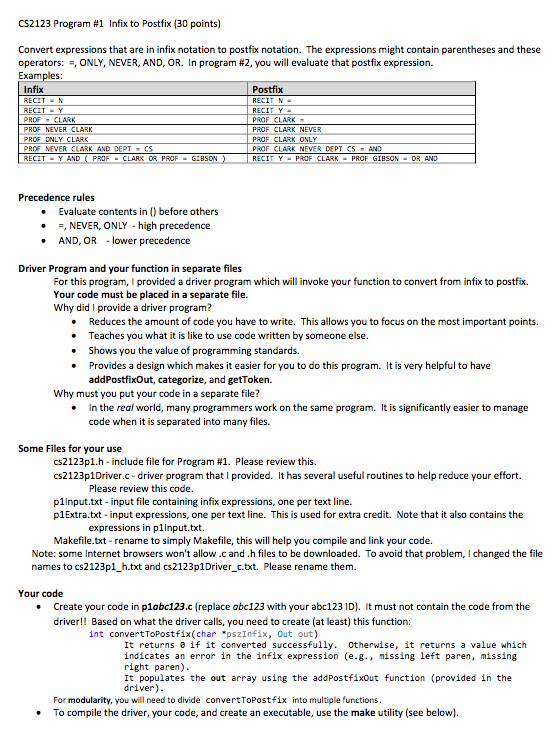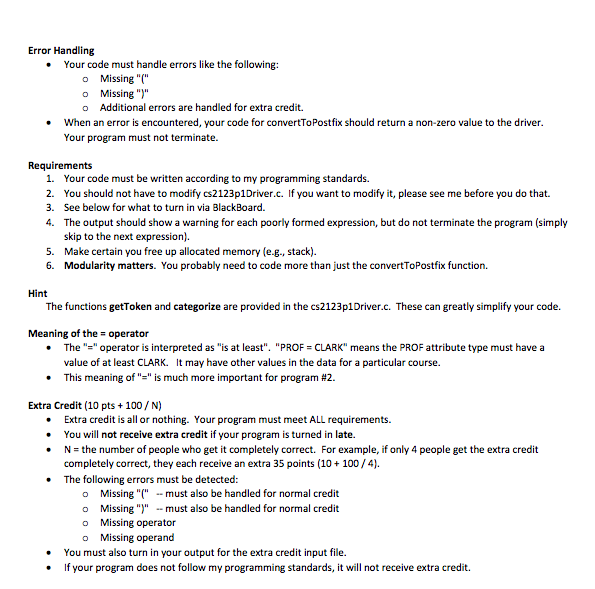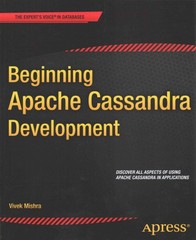Question
cs2123p1_h.txt: /********************************************************************** cs2123p1.h Purpose: Defines constants: max constants error constants warning constants categories of tokens (operator, operand, etc.) boolean constants Defines typedef for Token Element


cs2123p1_h.txt:
/********************************************************************** cs2123p1.h Purpose: Defines constants: max constants error constants warning constants categories of tokens (operator, operand, etc.) boolean constants Defines typedef for Token Element (values placed in stack or out) StackImp (array stack implementation) Stack (pointer to a StackImp) PostfixOutImp (out implementation) PostfixOut (pointer to an PostfixOutImp) Notes: **********************************************************************/ /*** constants ***/ // Maximum constants #define MAX_STACK_ELEM 20 // Maximum number of elements in the stack array #define MAX_TOKEN 50 // Maximum number of actual characters for a token #define MAX_OUT_ITEM 50 // Maximum number of PostfixOut items
// Error constants (program exit values) #define ERR_STACK_USAGE 901 #define ERR_OUT_OVERFLOW 902 #define ERR_ALGORITHM 903
// Warning constants. Warnings do not cause the program to exit. #define WARN_MISSING_RPAREN 801 #define WARN_MISSING_LPAREN 802 #define WARN_MISSING_OPERATOR 803 #define WARN_MISSING_OPERAND 804
// categories of tokens #define CAT_LPAREN 1 // ( #define CAT_RPAREN 2 // ) #define CAT_OPERATOR 3 // Operators are =, NEVER, ONLY / #define CAT_OPERAND 4 // These are attribute types or values
// boolean constants #define FALSE 0 #define TRUE 1
/*** typedef ***/
// Token typedef used for operators, operands, and parentheses typedef char Token[MAX_TOKEN + 1];
// Element typedef used for Element values placed in the stack or out array typedef struct { Token szToken; // Could be a variable, numeric constant, operator, // left parenthesis or right parenthesis int iCategory; // A value used to make it easier to handle // different cases for the types of tokens int iPrecedence; // An integer representing the operator // precedence. Higher values imply // higher precedence. } Element;
// StackImp typedef defines how we implement a stack using an array typedef struct { int iCount; // number of elements in stack. 0 is empty Element stackElementM[MAX_STACK_ELEM]; } StackImp;
// Stack typedef defines a pointer to a stack typedef StackImp *Stack;
// PostfixOutImp typedef defines how we implement out typedef struct { int iPostfixOutCount; Element postfixOutM[MAX_OUT_ITEM]; } PostfixOutImp;
// PostfixOut typedef defines a pointer to out typedef PostfixOutImp *PostfixOut;
/********** prototypes ***********/
// Stack functions
void push(Stack stack, Element value); Element pop(Stack stack); int isEmpty(Stack stack); Stack newStack(); void freeStack(Stack stack); Element topElement(Stack stack);
// Conversion to Postfix functions that Larry provided void categorize(Element *pElement); void addPostfixOut(PostfixOut postfixOut, Element element); void printPostfixOut(PostfixOut postfixOut);
// Conversion to Postfix functions that each student must implement int convertToPostfix(char *pszInfix, PostfixOut postfixOut);
// Utility routines void ErrExit(int iexitRC, char szFmt[], ...); char * getToken(char *pszInputTxt, char szToken[], int iTokenSize);
cs2123p1Driver_c.txt:
/****************************************************************************** cs2123p1Driver.c by Larry Clark Purpose: This program reads infix expressions and converts them from infix to postfix using a stack. Command Parameters: n/a Input: The standard input file stream contains infix expressions (one per input text line). Tokens in the expressions will be separated by one space. Some sample data: 1. RECIT = N 2. RECIT = Y 3. PROF = CLARK 4. PROF NEVER CLARK 5. PROF ONLY CLARK 6. PROF = CLARK AND RECIT = N 7. PROF NEVER CLARK AND DEPT = CS 8. RECIT = Y AND ( PROF = CLARK OR PROF = GIBSON ) 9. LANG ONLY C 10. ( LANG ONLY C OR LANG ONLY JAVA ) AND PREREQ NEVER CS2123 11. DEPT = CS AND RECIT = Y AND LANG = JAVA 12. DEPT = CS AND ( RECIT = Y OR LANG = PYTHON ) AND PROF = CLARK 13. DEPT = CS AND RECIT = Y OR LANG = PYTHON AND PROF = CLARK
Results: For each expression, print the original expression and its corresponding postfix expression. Returns: 0 - normal 901 - stack usage error (e.g., popping an empty stack) 902 - PostfixOut overflow 903 - algorithm error (see message for details) Notes: 1. This program uses an array to implement the stack. It has a maximum of MAX_STACK_ELEM elements. 2. This program uses an PostfixOut array for the resulting postfix expression. It has a maximum of MAX_OUT_ITEM elements. *******************************************************************************/ // If compiling using visual studio, tell the compiler not to give its warnings // about the safety of scanf and printf #define _CRT_SECURE_NO_WARNINGS 1
#include #include #include #include #include "cs2123p1.h"
// The following structure is used by the categorize function to help // categorize tokens and provide the precedence. static struct { char szSymbol[MAX_TOKEN + 1]; // token symbol such as "(" int iCategory; // CAT_OPERATOR, CAT_OPERAND, CAT_LPAREN or CAT_RPAREN int iPrecedence; // 0 - lowest precedence, 3 - highest precedence } symbolDefM[] = { {"(", CAT_LPAREN, 0} , {")", CAT_RPAREN, 0} , {"=", CAT_OPERATOR, 2} , {"NEVER", CAT_OPERATOR, 2} , {"ONLY", CAT_OPERATOR, 2} , {"AND", CAT_OPERATOR, 1} , {"OR", CAT_OPERATOR, 1} , {"", 0, 0} };
// Stack implementation using arrays. You are not required to document these. void push(Stack stack, Element value) { if (stack->iCount >= MAX_STACK_ELEM) ErrExit(ERR_STACK_USAGE , "Attempt to PUSH more than %d values on the array stack" , MAX_STACK_ELEM);
stack->stackElementM[stack->iCount] = value; stack->iCount++; } Element pop(Stack stack) { if (isEmpty(stack)) ErrExit(ERR_STACK_USAGE , "Attempt to POP an empty array stack"); stack->iCount--; return stack->stackElementM[stack->iCount];
} Element topElement(Stack stack) { if (isEmpty(stack)) ErrExit(ERR_STACK_USAGE , "Attempt to examine topElement of an empty array stack"); return stack->stackElementM[stack->iCount-1]; // return the top } int isEmpty(Stack stack) { return stack->iCount
Stack newStack() { Stack stack = (Stack) malloc(sizeof(StackImp)); stack->iCount = 0; return stack; }
void freeStack(Stack stack) { free (stack); }
// Main program for the driver
int main(int argc, char *argv[]) { // Allocate the memory for the postfix result PostfixOut postfixOut = malloc(sizeof(PostfixOutImp)); char szInputBuffer[100]; // entire input line int rc; int iLineCount = 0; // read text lines containing expressions until EOF while (fgets(szInputBuffer, 100, stdin) != NULL) { iLineCount++;
// Ignore the line if it only contains a linefeed if (szInputBuffer[0] == ' ') continue; printf("Expr # %d: %s", iLineCount, szInputBuffer); postfixOut->iPostfixOutCount = 0; // reset out to empty
// Invoke the student's convertToPostfix function rc = convertToPostfix(szInputBuffer, postfixOut); switch (rc) { case 0: // ok so print the postfix printPostfixOut(postfixOut); break; case WARN_MISSING_LPAREN: printf("\tWarning: missing left parenthesis "); break; case WARN_MISSING_RPAREN: printf("\tWarning: missing right parenthesis "); break; case WARN_MISSING_OPERATOR: printf("\tWarning: missing operator "); break; case WARN_MISSING_OPERAND: printf("\tWarning: missing operand "); break; default: printf("\t warning = %d ", rc); } } printf(" "); free(postfixOut); fclose(stdin); fclose(stdout); return 0; }
/******************** addPostfixOut ************************************** void addPostfixOut(PostfixOut postfixOut, Element element) Purpose: Adds an element to postfixOut. Parameters: I/O PostfixOut postfixOut Stores the postfix expression I Element element Element structure to be added to postfixOut. Returns: n/a Notes: - Since postfixOut uses an array, addPostfixOut does a boundary check for overflow. **************************************************************************/ void addPostfixOut(PostfixOut postfixOut, Element element) { if (postfixOut->iPostfixOutCount >= MAX_OUT_ITEM) ErrExit(ERR_OUT_OVERFLOW , "Overflow in the postfixOut array"); postfixOut->postfixOutM[postfixOut->iPostfixOutCount] = element; postfixOut->iPostfixOutCount++; }
/******************** printPostfixOut ************************************** void printPostfixOut(PostfixOut postfixOut) Purpose: prints the contents of the postfixOutM array to stdout Parameters: I PostfixOut postfixOut The postfx expression Returns: n/a Notes: - Prints 18 tokens from postfixOut per line **************************************************************************/ void printPostfixOut(PostfixOut postfixOut) { int i; if (postfixOut == NULL) { printf("*** ERROR PostfixOut is NULL "); return; } printf("\t"); // loop through each element in the postfixOut array for (i = 0; i iPostfixOutCount; i++) { printf("%s ", postfixOut->postfixOutM[i].szToken); if ((i + 1) % 18 == 0) printf(" \t"); } printf(" "); }
/******************** categorize ************************************** void categorize(Element *pElement) Purpose: Categorizes a token providing its precedence (0 is lowest, higher integers are a higher precedence) and category (operator, operand, left paren, right paren). Since the category is an integer, it can be used in a switch statement. Parameters: I/O Element *pElement pointer to an element structure which will be modified by this function Returns: n/a Notes: - The input parameter, pElement must point to an existing Element structure. Its attribute, szToken, must already be populated. - This function will populate the iCategory and iPrecedence values in the Element structure referenced by pElement. - Uses the symbolDefM array to help categorize tokens **************************************************************************/ void categorize(Element *pElement) { int i; // loop through the symbolDefM array until an empty symbol value is found // marking the end of the symbolDefM array for (i = 0; symbolDefM[i].szSymbol[0] != '\0'; i++) { // does the element's token match the symbol in the symbolDefM array? if (strcmp(pElement->szToken, symbolDefM[i].szSymbol) == 0) { // matched, so use its precedence and category pElement->iPrecedence = symbolDefM[i].iPrecedence; pElement->iCategory = symbolDefM[i].iCategory; return; } } // must be an operand pElement->iPrecedence = 0; pElement->iCategory = CAT_OPERAND; }
/******************** ErrExit ************************************** void ErrExit(int iexitRC, char szFmt[], ... ) Purpose: Prints an error message defined by the printf-like szFmt and the corresponding arguments to that function. The number of arguments after szFmt varies dependent on the format codes in szFmt. It also exits the program with the specified exit return code. Parameters: I int iexitRC Exit return code for the program I char szFmt[] This contains the message to be printed and format codes (just like printf) for values that we want to print. I ... A variable-number of additional arguments which correspond to what is needed by the format codes in szFmt. Returns: Returns a program exit return code: the value of iexitRC. Notes: - Prints "ERROR: " followed by the formatted error message specified in szFmt. - Prints the file path and file name of the program having the error. This is the file that contains this routine. - Requires including **************************************************************************/ void ErrExit(int iexitRC, char szFmt[], ... ) { va_list args; // This is the standard C variable argument list type va_start(args, szFmt); // This tells the compiler where the variable arguments // begins. They begin after szFmt. printf("ERROR: "); vprintf(szFmt, args); // vprintf receives a printf format string and a // va_list argument va_end(args); // let the C environment know we are finished with the // va_list argument printf(" \tEncountered in file %s ", __FILE__); // this 2nd arg is filled in by // the pre-compiler exit(iexitRC); } /******************** getToken ************************************** char * getToken (char *pszInputTxt, char szToken[], int iTokenSize) Purpose: Examines the input text to return the next token. It also returns the position in the text after that token. This function does not skip over white space, but it assumes the input uses spaces to separate tokens. Parameters: I char *pszInputTxt input buffer to be parsed O char szToken[] Returned token. I int iTokenSize The size of the token variable. This is used to prevent overwriting memory. The size should be the memory size minus 1 (for the zero byte). Returns: Functionally: Pointer to the next character following the delimiter after the token. NULL - no token found. szToken parm - the returned token. If not found, it will be an empty string. Notes: - If the token is larger than iTokenSize, we return a truncated value. - If a token isn't found, szToken is set to an empty string - This function does not skip over white space occurring prior to the token. **************************************************************************/ char * getToken(char *pszInputTxt, char szToken[], int iTokenSize) { int iDelimPos; // found position of delim int iCopy; // number of characters to copy char szDelims[20] = " "; // delimiters szToken[0] = '\0';
// check for NULL pointer if (pszInputTxt == NULL) ErrExit(ERR_ALGORITHM , "getToken passed a NULL pointer");
// Check for no token if at zero byte if (*pszInputTxt == '\0') return NULL;
// get the position of the first delim iDelimPos = strcspn(pszInputTxt, szDelims);
// if the delim position is at the first character, return no token. if (iDelimPos == 0) return NULL;
// see if we have more characters than target token, if so, trunc if (iDelimPos > iTokenSize) iCopy = iTokenSize; // truncated size else iCopy = iDelimPos;
// copy the token into the target token variable memcpy(szToken, pszInputTxt, iCopy); szToken[iCopy] = '\0'; // null terminate
// advance the position pszInputTxt += iDelimPos; if (*pszInputTxt == '\0') return pszInputTxt; else return pszInputTxt + 1; }
Makefile.txt:
# Define the machine object files for your program
OBJECTS = p1abc123.o cs2123p1Driver.o
# Define your include file
INCLUDES = cs2123p1.h
# make for the executable
p1: ${OBJECTS}
gcc -g -o p1 ${OBJECTS}
# Simple suffix rules for the .o
%.o: %.c ${INCLUDES}
gcc -g -c $
# Clean the .o files
clean:
rm -f ${OBJECTS}
p1Input.txt:
RECIT = N RECIT = Y PROF = CLARK PROF NEVER CLARK PROF ONLY CLARK PROF = CLARK AND RECIT = N PROF NEVER CLARK AND DEPT = CS RECIT = Y AND ( PROF = CLARK OR PROF = GIBSON ) RECIT = Y AND ( PROF = CLARK AND PROF = GIBSON ) LANG ONLY C ( LANG ONLY C OR LANG ONLY JAVA ) AND PREREQ NEVER CS2123 DEPT = CS AND RECIT = N AND LANG = JAVA DEPT = CS AND ( RECIT = Y OR LANG = PYTHON ) AND PROF = CLARK DEPT = CS AND RECIT = Y OR LANG = PYTHON AND PROF = CLARK ( ( ( LANG NEVER JAVA ) ) ) ( DEPT = XX PROF = SMITH ) ( ( DEPT = XX ) ) ) (
Error Handling Your code must handle errors like the following: . o Missing"" o Missing"" o Additional errors are handled for extra credit. When an error is encountered, your code for convertToPostfix should return a non-zero value to the driver Your program must not terminate. . Requirements 1. 2. 3. 4. Your code must be written according to my programming standards. You should not have to modify cs2123p1Driver.c. If you want to modify it, please see me before you do that. See below for what to turn in via BlackBoard. The output should show a warning for each poorly formed expression, but do not terminate the program (simply skip to the next expression). 5. Make certain you free up allocated memory (e.g., stack). 6. Modularity matters. You probably need to code more than just the convertToPostfix function. Hint The functions getToken and categorize are provided in the cs2123p1Driver.c. These can greatly simplify your code. Meaning of the = operator . The" operator is interpreted as "is at least". "PROF CLARK" means the PROF attribute type must have a value of at least CLARK. It may have other values in the data for a particular course. This meaning of "-" is much more important for program #2. Extra Credit (10 pts 100/N) Extra credit is all or nothing. Your program must meet ALL requirements. You will not receive extra credit if your program is turned in late. . the number of people who get it completely correct. For example, if only 4 people get the extra credit completely correct, they each receive an extra 35 points (10 100/4) The following errors must be detected: o Missing"(" must also be handled for normal credit Missing ")" .. must also be handled for normal credit Missing operator Missing operand o o You must also turn in your output for the extra credit input file. If your program does not follow my programming standards, it will not receive extra creditStep by Step Solution
There are 3 Steps involved in it
Step: 1

Get Instant Access to Expert-Tailored Solutions
See step-by-step solutions with expert insights and AI powered tools for academic success
Step: 2

Step: 3

Ace Your Homework with AI
Get the answers you need in no time with our AI-driven, step-by-step assistance
Get Started


